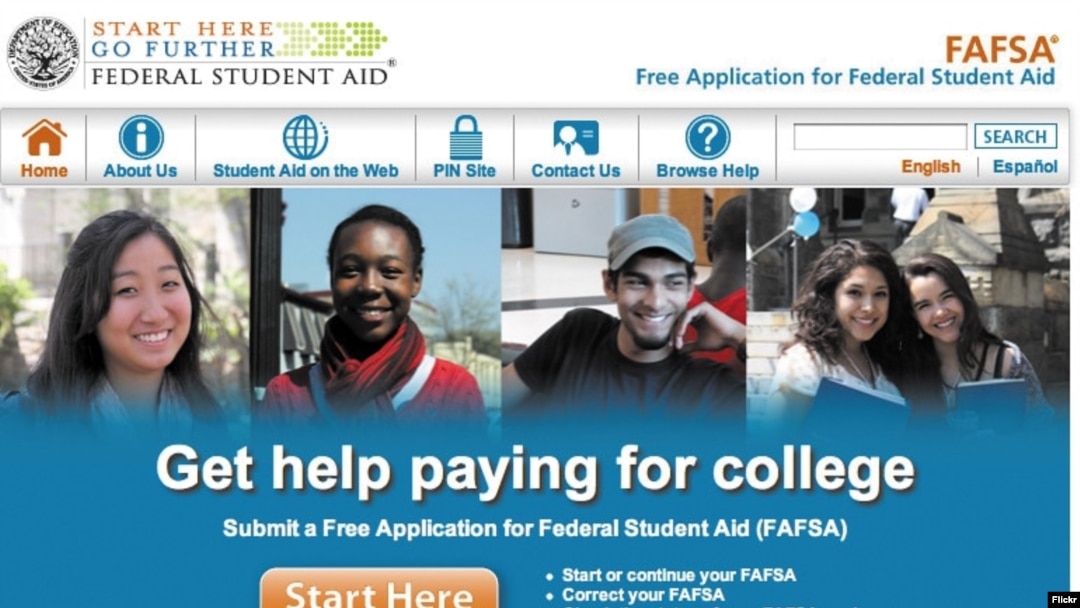International students are not often eligible for federal student aid, and typically pay full tuition and fees for their college and university education that can cost more than $100,000 a year.
“The fact that I most likely will not be able to go to university because only two of the ones I’m applying to offer financial aid to international students and I can’t afford to go otherwise, literally kills me, like it’s breaking my heart,” tweeted Isabella Romanov, a British citizen who told VOA she plans to study in the U.S.
But there are exceptions.
International students who are not citizens but fall into eligibility categories may apply for federal financial aid, according to Federal Student Aid (FSA).
The categories include:
Students who are a U.S. national — including natives of American Samoa and Swains Island — or a U.S. permanent resident — commonly referred to as a green card holder. A U.S. national is defined by the U.S. Department of Homeland Security as “a person owing permanent allegiance to a state.” U.S. permanent residents “are non-citizens who are lawfully authorized to live permanently within the United States.”
If they have an Arrival-Departure Record (I-94) from U.S. Citizen and Immigration Services (USCIS), showing their status as “refugee,” “asylum granted,” “Cuban Haitian entrant,” “conditional entrant” or “parolee.” To qualify as a parolee, students “must be able to provide evidence from the USCIS that you are in the United States for other than a temporary purpose with the intention of becoming a U.S. citizen or permanent resident,” and must be paroled for at least one year.
If a student or their parents holds a T-1 nonimmigrant status visa, granted to victims of human trafficking. The college or career center’s financial aid office will ask for a copy of the visa and/or certification letter from the U.S. Department of Health and Human Services.
If students are a “battered immigrant-qualified alien,” meaning that they are a victim of abuse by their U.S. citizen or permanent resident spouse, or “are the child of a person designated as such under the Violence Against Women Act (VAWA).”
Students from the Republic of Palau “are eligible for Federal Pell Grants, Federal Supplemental Educational Opportunity Grants, and Federal Work-Study,” while those from the Federated States of Micronesia and the Republic of the Marshall Islands are only eligible for Pell grants. Pell grants are not loans and do not need to be repaid.
The website explains that, “To qualify for federal student aid, certain eligible noncitizens must be able to provide evidence from the USCIS that they are in the United States for other than a temporary purpose with the intention of becoming a U.S. citizen or permanent resident.”
However, undocumented students, and students who have been granted Deferred Action for Childhood Arrivals (DACA), are not eligible for any type of federal aid — though they may be eligible for aid from their university of the state in which they live.
In this June 18, 2020, photo, Deferred Action for Childhood Arrivals (DACA) students celebrate in front of the Supreme Court after the Supreme Court rejected President Donald Trump's effort to end legal protections for young immigrants in Washington.
In some cases, DACA recipients may be asked to complete a Free Application for Federal Student Aid (FAFSA) to receive aid from their institution or their state of residence. FAFSA is an official federal application for all eligible students to apply for financial aid — like grants and loans — from the U.S. government.
A parent’s citizenship or immigration status will not affect a student’s eligibility for financial aid.
If a student’s permanent residence status has expired, they are no longer eligible for federal student aid. Students whose green cards have expired are encouraged to check their status as a legal permanent resident and if they are able to renew the card, if necessary.
That being said, if they are a Cuban Haitian entrant, they are still an eligible noncitizen, even if the expiration date has passed.
Students are not considered eligible non-citizens and not eligible to receive federal student aid if they:
Are studying in the U.S. on an F-1 or F-2 nonimmigrant student visa, or on a J-1 or J-2 nonimmigrant Exchange Visitor Visa. According to the U.S. State Department’s EducationUSA — a U.S. Department of State network of more than 430 international student advising centers around the world — the F-1 visa is used for those who wish to study at an accredited college or university, or to study English at an English language institution, while F-2 is the visa for the spouses and children of those who use the F-1 visa.
The J-1 visa is used for participation in a high school or university exchange program. Like the F-2 visa, the J-2 visa is for the spouses and children of J-1 visa holders.
Hold a G series visa. To have a G visa, “you must be traveling to attend meetings at, visit, or work at a designated international organization,” according to the U.S. Department of State.
Have been given a “Notice of Approval to Apply for Permanent Residence” (I-171 or I-464).
For those who may not qualify for federal student aid, there are still ways to help fund their education, like scholarships and private loans. The Federal Student Aid (FSA) website encourages students to check out the U.S. Department of Labor’s online scholarship search, as well as EducationUSA.
An international student’s college or own government — including the country’s embassy or consulate in the U.S. — may provide funding resources for study in the U.S.
About 60% of international students pay for their U.S. college or university education through self or family funding. Some receive funding from their native governments, the U.S. university they attend, or private loans and grants.


